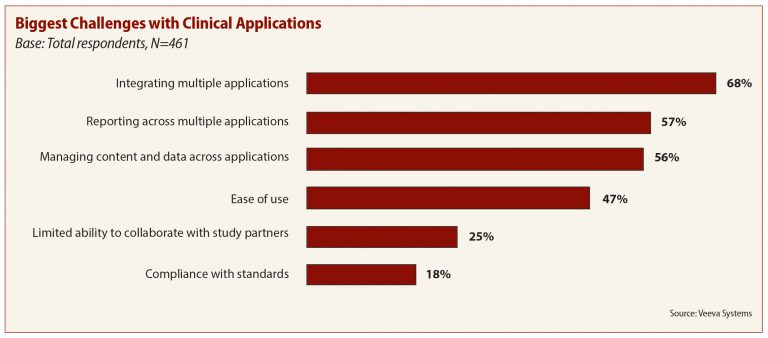
Home » Improve Trials with Integrated Electronic Systems Instead of Information Silos, Survey Says
Improve Trials with Integrated Electronic Systems Instead of Information Silos, Survey Says
June 24, 2019
Sponsors recognize the advantages of using a single system to handle all trial operations, but progress from theory to practice has been slow, a new survey shows.
Software company Veeva Systems’ recent survey of clinical trial professionals about the benefits of unified clinical operations — single centralized technology systems that handle all operations tasks — points out the major problems created by using disconnected systems for individual functions.
The top two challenges the 461 respondents identified are the direct result of keeping data siloed in disparate systems, Veeva’s report says. Integrating multiple applications was the top problem, cited by 68 percent of respondents, followed by difficulty reporting across multiple applications, chosen by 57 percent.

Respondents reported experiencing problems with tracking and reporting data (71 percent), misfiled or missing documents (57 percent) and manual document exchange (47 percent).
CROs responding to the survey reported more challenges with misfiled documents than sponsors (59 percent and 54 percent respectively) and with redundant data transcription (43 percent and 33 percent respectively). Veeva suggests the difference could be due to CROs’ greater use of paper and email to exchange trial documents with sites.
The adoption of unified systems would break down silos and make information exchange and collaboration easier, says Veeva vice president of clinical marketing strategy Jim Reilly.
“What the idea of unified clinical technology is saying is, let’s change the dynamic where pharma, CROs, sites alike end up looking at individual technology solutions that solve individual business needs in clinical,” Reilly says, “and instead move to a more unified model where they can leverage more modern technologies that bring together what has historically been disparate full sets.”
The survey shows widespread agreement among respondents that implementation of more integrated technology can address the primary problems that slow down the clinical trial process — reliance on manual processes, ineffective collaboration with sites and lack of visibility into and oversight of clinical trials.
Unified clinical operations help improve oversight and visibility according to 70 percent of survey respondents. Speeding up trials was cited by 63 percent as a benefit of unified systems and smoother collaboration with stakeholders was named by 61 percent.
Outdated methods also are bogging down trials, the survey shows. The problem is notable particularly in the study start-up process; 81 percent of respondents said they still use spreadsheets to manage study start-up tasks. In the current climate, sites often have to manually respond to sponsor and CRO surveys and frequently end up sending redundant information to the sponsors and CROs they work with on multiple trials.
But some progress is being made. Nearly one-quarter (23 percent) of survey respondents say they are using newer, purpose-built study start-up applications.
Among function-specific electronic systems that have replaced manual work, the most prevalent are electronic data capture (EDC), which 88 percent of respondents reported using, followed by electronic trial master files (eTMF) at 69 percent and clinical trial management systems (CTMS) at 61 percent.
Almost all respondents (95 percent) cited the need for better use of CTMS. Improved reporting topped the list of reasons to modernize CTMS use at 68 percent. Increased trial visibility was on 60 percent of respondents’ wish lists and enabling proactive risk mitigation came in at 58 percent.
The environment is ripe for change, according to Reilly. “There is a significant industrywide opportunity to improve study visibility and partner collaboration to speed trial execution. As more sponsors, CROs and sites focus on streamlining clinical processes and systems, drug development will become more efficient and stakeholders will be better aligned throughout the trial lifecycle.”
Read the survey report here: https://bit.ly/2WXhpL4.
Upcoming Events
-
23Apr
-
07May
-
14May




